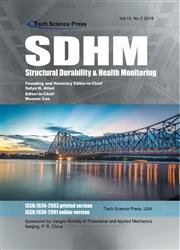An Analysis of the Dynamic Behavior of Damaged Reinforced Concrete Bridges under Moving Vehicle Loads by Using the Moving Mesh Technique
Q2 Engineering
SDHM Structural Durability and Health Monitoring
Pub Date : 2023-01-01
DOI:10.32604/sdhm.2023.030075
引用次数: 0
Abstract
This work proposes a numerical investigation on the effects of damage on the structural response of Reinforced Concrete (RC) bridge structures commonly adopted in highway and railway networks. An effective three-dimensional FE-based numerical model is developed to analyze the bridge’s structural response under several damage scenarios, including the effects of moving vehicle loads. In particular, the longitudinal and transversal beams are modeled through solid finite elements, while horizontal slabs are made of shell elements. Damage phenomena are also incorporated in the numerical model according to a smeared approach consistent with Continuum Damage Mechanics (CDM). In such a context, the proposed method utilizes an advanced and efficient computational strategy for reproducing Vehicle-Bridge Interaction (VBI) effects based on a moving mesh technique consistent with the Arbitrary Lagrangian-Eulerian (ALE) formulation. The proposed model adopts a moving mesh interface for tracing the positions of the contact points between the vehicle’s wheels and the bridge slabs. Such modeling strategy avoids using extremely refined discretization for structural members, thus drastically reducing computational efforts. Vibrational analyses in terms of damage scenarios are presented to verify how the presence of damage affects the natural frequencies of the structural system. In addition, a comprehensive investigation regarding the response of the bridge under moving vehicles is developed, also providing results in terms of Dynamic Amplification Factor (DAFs) for typical design bridge variables.用动网格技术分析移动车辆荷载作用下钢筋混凝土损伤桥梁的动力特性
本文对公路和铁路网络中常用的钢筋混凝土桥梁结构的损伤对结构响应的影响进行了数值研究。建立了一种有效的基于有限元的三维数值模型,分析了桥梁在几种损伤情况下的结构响应,包括移动车辆荷载的影响。特别是,纵向和横向梁通过实体有限元建模,而水平板由壳单元组成。根据连续损伤力学(CDM)的涂抹方法,将损伤现象纳入数值模型。在这种情况下,该方法采用了一种先进而高效的计算策略,基于与任意拉格朗日-欧拉(ALE)公式一致的移动网格技术来再现车桥相互作用(VBI)效应。该模型采用移动网格界面跟踪车辆车轮与桥板接触点的位置。这种建模策略避免了对结构构件进行极其精细的离散化,从而大大减少了计算量。根据损伤情况进行振动分析,以验证损伤的存在如何影响结构系统的固有频率。此外,对桥梁在车辆作用下的响应进行了全面的研究,并提供了典型设计桥梁变量的动力放大系数(daf)的结果。
本文章由计算机程序翻译,如有差异,请以英文原文为准。
求助全文
约1分钟内获得全文
求助全文
来源期刊

SDHM Structural Durability and Health Monitoring
Engineering-Building and Construction
CiteScore
2.40
自引率
0.00%
发文量
29
期刊介绍:
In order to maintain a reasonable cost for large scale structures such as airframes, offshore structures, nuclear plants etc., it is generally accepted that improved methods for structural integrity and durability assessment are required. Structural Health Monitoring (SHM) had emerged as an active area of research for fatigue life and damage accumulation prognostics. This is important for design and maintains of new and ageing structures.
 求助内容:
求助内容: 应助结果提醒方式:
应助结果提醒方式:


